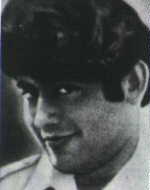Weiss (Tzahor), Shimshon
The only son of Aharon and Elisabeth. He was born on February 16, 1949, in Nitra, Czechoslovakia. Three months later his parents immigrated to Israel and he was with them. After a few days in a transit camp, they were moved to Moshav Hazoreim. After three months, the family moved to a nearby Arab village and from there moved to Moshav Mazor, between Petah Tikva and Lod. Samson grew up like other village children; He soon became part of the children’s society and began to attend elementary school in the moshav. In this school he was educated and acquired his basic education. He was a good student, diligent and disciplined and used to devote the hours he spent to the games, after returning home from school and preparing his lessons. During this period he and his friends began to prepare the ground for the local soccer field and over time, this game became one of his hobbies. He also very much liked growing grasses and nurturing ornamental gardens. When he was nine years old (fourth grader), the family’s economic situation was very difficult, and the parents were talking about emigrating from Israel to relatives abroad to improve their situation. They discussed this with Samson, but he vehemently objected to them and added, “If you want to go down, I will stay here, even alone.” He was so attached to the place and the homeland that the parents accepted his opinion and stayed. When he finished his elementary studies, he studied at the Max Payne School in Tel Aviv the electrical profession he loved from his youth. Here too he was among the outstanding students and was very active in social life. He had a great sense of technical skills and especially devoted himself to the dismantling and assembling of electricity systems, and in early 1966 he was drafted into the IDF. After passing the training stages like any soldier, he went on to undergo a tank electrician course, and when the Six Day War broke out, the parents learned that he was one of the first to enter the Rafah area. He was naturally closed and therefore did not know what was going on with him during his regular service. Shortly after his release, the parents urged him that after his release he would come to their aid in the village and promised to do everything so that he could study at the Hebrew Technion in Haifa and continue with the electricity profession. But Samson decided to stay in the career army. Moreover, he told his parents that he was about to go abroad for some study. The parents, of course, did not detain him. Shimshon left and returned after a short while, Simcha and satisfied. His friends told them how close the army was to his Lev and that all he cared about was to help the members of the electricity department, to whom he devoted himself day and night. He also worked on a single successful Arab organization, organized Sabbath evenings, parties and trips where he was always the main concern to the smallest detail. His girlfriend was pleasant and cheerful and after every event – a party or a trip – he would tell his experiences. In the field of sports he was always willing to help organize marches, games and competitions on behalf of Hapoel or the movement. He often devoted Saturdays and short vacations to help members in races and fencing competitions. He completed his matriculation exams, enrolled at Tel Aviv University, the Faculty of Economics and was accepted for the academic year 1972, and in November 1971 was about to begin his studies, but on the 28th of Elul 5731 (August 29, 1971) . He was laid to rest in the military section of the cemetery in Segula. His commander wrote a letter of condolence to his parents and wrote: “Your loved one began his military service as a regular soldier in the canal, and his dedication to work was demonstrated by his long service in the unit and in the front lines. Class BA key position. – – – His talent at work led to improvements and streamlining the framework of the profession. He was involved in every event in the unit, both in the sports field and in the entertainment and entertainment areas. “His commander continues to write:” Ehud was very fond of his soldiers and commanders and was the driving force in the company. “Signed by the head of the Personnel Directorate at the General Staff, For his service in the regular army and for seeing his service as a mission and filling it with devotion and love, for he was always devoted and dedicated “to dedicating himself to increasing the strength of the IDF and to nurturing his spirit when the good of the state is in his sight.” In 1975, his friends from the unit, together with members of Moshav Mazor and the family, published a book in his memory; Every year there is an international fencing competition in Moshav Mazor and the “Shimshon Cup” in honor of the winner; The National Counterfeiting Committee of the Israel Sports Association issued a booklet in 1972 about this event and its history; With the consent of the military rabbinate and its commanders, it was hung on the base where he had served, a curtain on his name on the ark and a memorial candle lit in his memory.
